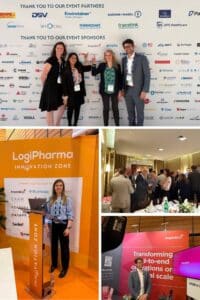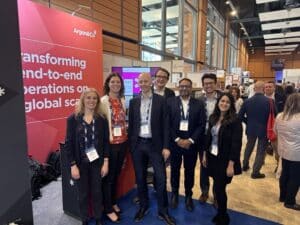Recently, our Life Sciences teams from London and Paris attended the 25th anniversary of LogiPharma, the world’s leading life sciences supply chain event in Lyon, France.
The conference brings together experts and thought leaders from across the pharmaceutical industry, with representatives from each of the top 20 leading organisations.
To kick off the week, as one of the sponsors of 
On the opening day of the conference, Head of Data Operations for Global IRIS (Argon & Co), Rachel Noll hosted an engaging demo on leveraging generative AI to transform operations with ‘zero downtime’. The session explored the use of soft process automation and AI in an application created and installed for a leading whisky manufacturer.
On day two, Associate Partner Michel Savini was joined by VP Supply Chain Transformation at Ceva Animal Health, Fabien Roumeaux, for an interactive masterclass session. The masterclass showcased strategies for building high-performing teams to ensure the success of complex business transformations. It was great to see such engaged audiences at both our demo and masterclass sessions across the week.
Our London and Paris Life Sciences teams attended various key speaker sessions held by thought leaders in the life sciences supply chain sector. Here are some of our key learnings:
Leveraging data and AI:
This was one of the primary talking points of this year’s conference, with numerous feedback and agentic use cases delivered by industry leaders.
- Our attendees were surprised to discover in one of the AI Logistics discussions, only 8% of attendees surveyed had actually implemented AI in their transportation and distribution operations. A large majority of 73% hadn’t started at all
- Although there is acceptance that now is the perfect time to leverage data and AI’s capabilities, 90% of the participants questioned in the opening keynote believe that AI will be a lever or a cause of business disruption, but there are very few industrialised use cases, all of which remain at best at the ideation stage
- We are witnessing a shift towards practical, cross functional applications. Instead of large-scale transformations, the focus is now on solving everyday challenges and unlocking efficient, tangible value
The importance of collaboration:
- The importance of networking was clear throughout the event. Connecting the dots between industry leaders, long-time customers and fresh faces was extremely beneficial
- With scope 3 emissions accounting for up to 97% of a company’s carbon footprint in life sciences, collaboration between procurement and sustainability teams is essential. One company showcased a dedicated function bridging procurement and sustainability teams, enabling: ESG criteria in tenders, category strategy, trackers managed by procurement teams as part of their targets, and key metrics discussed in quarterly business reviews with suppliers
Change management in transformation:
With 70% of transformation projects reportedly failing, our team’s final takeaway was the importance of people in ensuring the success of any organisational change. People are ultimately responsible for making any change stick and it is important to bring them along on the journey: mobilising and engaging teams early; creating safe spaces to discuss struggles and celebrate successes; and shifting the mindset from siloed thinking to collective progress. The best technology, whether it is a new system or AI tool can help, but it’s ultimately down to an organisation’s people to make a transformation succeed.
We were delighted to see a full room of attendees at our masterclass and demo sessions and would like to thank everyone who visited our stand during the conference.



